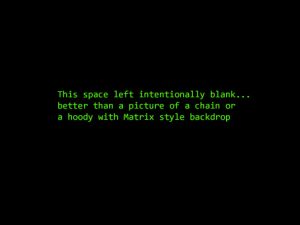Based on personal experience, and second hand reports, there’s still some confusion out there that results in lots of wasted time for job seekers, hiring organisations, and recruitment agents.
There is a want or a need to blame recruiters for any hiring difficulties, but we need to stop that. There are some who try to do the right thing but are limited by a lack of any sector experience. Others have been inspired by Wolf Of Wall Street while trying to sound like Simon Cowell.

It’s on the hiring organisation? Well, it is, but let’s take responsibility for the problem as a sector for a change. Infosec likes to shift responsibility and not take ownership of the problem. We blame CEOs, users, vendors, recruiters, dogs, cats, “Russia“, “China” – anyone but ourselves. Could it be we failed as a sector to raise awareness, both internally and externally?
So What Are Common Understandings Of Security Roles?
After 25 years+ we still don’t have universally accepted role descriptions, but at least we can say that some patterns are emerging. Security roles involve looking at risk holistically, and sometimes advising on how to deal with risk:
- Security Engineers assess risk and design and sometimes also implement controls. BTW some sectors, legal in particular, still struggle with this. Someone who installs security products is in an IT ops role. Someone who upgrades and maintains a firewall is an IT ops role. The fact that a firewall is a security control doesn’t make this a security engineering function.
- Security Architects take risk and compliance goals into account when they formulate requirements for engineers.
- Security Analysts are usually level 2 SOC analysts, who make risk assessments in response to an alert or vulnerability, and act accordingly.
This subject evokes as much emotion as CISSP. There are lots of opinions out there. We owe to ourselves to be objective. There are plenty of sources of information on these role definitions.
No Aspect Of Risk Assessment != Security. This is Devops.
If there is no aspect of risk involved with a role, you shouldn’t looking for a security professional. You are looking for DEVOPS peeps. Not security peeps.
If you want a resource to install and configure tools in cloud – that is DEVOPS. It is not Devsecops. It is not Security Engineering or Architecture. It is not Landscape Architecture or Accounting. It is not Professional Dog Walker. it is DEVOPS. And you should hire a DEVOPS person. If you want a resource to install and configure appsec tools for CI/CD – that is DEVOPS. If you want a resource to advise on or address findings from appsec tools, that is a Security Analyst in the first case, DEVSECOPS in the 2nd case. In the 2nd case you can hire a security bod with coding experience – they do exist.
Ok Then So What Does A DevSecOps Beast Look Like?
DevSecOps peeps have an attack mindset from their time served in appsec/pen testing, and are able to take on board the holistic view of risk across multiple technologies. They are also coders, and can easily adapt to and learn multiple different devops tools. This is not a role for newly graduated peeps.
Doing Security With Non-Security Professionals Is At Best Highly Expensive
Another important point: what usually happens because of the skills gap in infosec:
- Cloud: devops fills the gap.
- On-premise: Network Engineers fill the gap.

Why doesn’t this work? I’ve met lots of folk who wear the aforementioned badges. Lots of them understand what security controls are for. Lots of them understand what XSS is. But what none of them understand is risk. That only comes from having an attack mindset. The result will be overspend usually – every security control ever conceived by humans will be deployed, while also having an infrastructure that’s full of holes (e.g. default install IDS and WAF is generally fairly useless and comes with a high price tag).
Vulnerability assessment is heavily impacted by not engaging security peeps. Devops peeps can deploy code testing tools and interpret the output. But a lack of a holistic view or an attack mindset, will result in either no response to the vulnerability, or an excessive response. Basically, the Threat And Vulnerability Management capability is broken under these circumstances – a sadly very common scenario.
SIEM/Logging is heavily impacted – what will happen is either nothing (default logging – “we have Stackdriver, we’re ok”), or a SIEM tool will be provisioned which becomes a black hole for events and also budgets. All possible events are configured from every log source. Not so great. No custom use cases will be developed. The capability will cost zillions while also not alerting when something bad is going down.
Identity Management – is not deploying a ForgeRock (please know what you’re getting into with this – its a fork of Sun Microsystems/Oracle’s identity management show) or an Azure AD and that’s it, job done. If you just deploy this with no thought of the problem you’re trying to solve in identity management, you will be fired.
One of the classic risk problems that emerges when no security input is taken: “there is no personally identifiable information in development Virtual Private Clouds, so there is no need for security controls”. Well – intelligence vulnerability such as database schema – attackers love this. And don’t you want your code to be safe and available?
You see a pattern here. It’s all or nothing. Either of which ends up being very expensive or worse. But actually come to think of it, expensive is the goal in some cases. Hold that thought maybe.
A Final Word
So – if the word risk doesn’t appear anywhere in the job description, it is nothing to do with security. You are looking for devops peeps in this case. And – security is an important consideration for cloud migrations.

